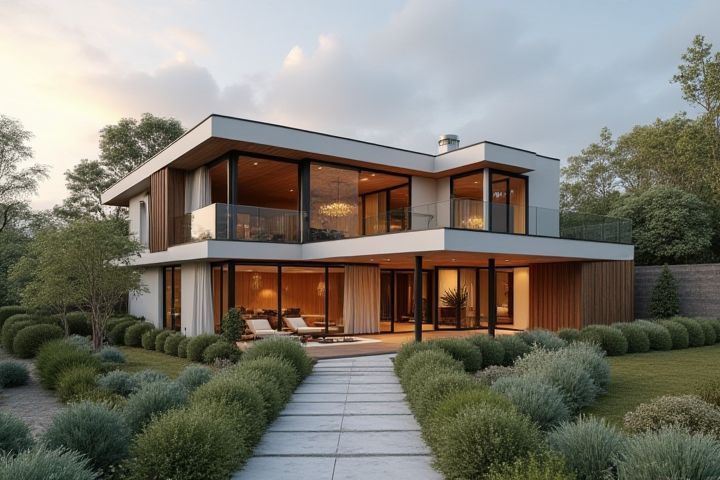
Choosing a house architect involves several key considerations to ensure your vision is realized effectively. Begin by researching local architects with a strong portfolio that aligns with your design preferences and functional requirements. Evaluate their experience by examining past projects and client testimonials, focusing on their ability to manage timelines and budgets effectively. Schedule consultations to discuss your ideas, allowing you to gauge their communication style and understanding of your needs. Verify their credentials and professional affiliations, as well as their familiarity with local building codes and regulations, to ensure a smooth design and construction process.
How To Choose A House Architect
Verify credentials
When selecting a house architect, it is crucial to verify their credentials to ensure they meet professional standards. Check if the architect holds a valid license, often required by state regulations, which demonstrates their competency and adherence to industry standards. Review their educational background, ideally featuring a degree from an accredited architecture program, and confirm their membership in professional associations such as the American Institute of Architects (AIA). Requesting references from previous clients can also provide insights into their design capabilities and reliability throughout the construction process.
Review portfolio
When selecting a house architect, reviewing their portfolio is crucial for understanding their design style and capabilities. Look for a diverse range of completed projects that showcase successful residential designs, particularly those similar to your vision. Pay attention to the quality of workmanship, creativity, and how well each project meets the client's needs and lifestyle. To ensure a good fit, consider reaching out to past clients for feedback on their experiences and satisfaction with the architect's services.
Check references
When choosing a house architect, it's crucial to check references thoroughly to assess their capability and reliability. Start by requesting a list of previous clients, and reach out to at least four or five for firsthand accounts of their experience, focusing on the architect's communication skills, adherence to timelines, and quality of work. Additionally, reviewing completed projects allows you to gauge the architect's design style and versatility, ensuring it aligns with your vision. Remember that positive testimonials coupled with a portfolio showcasing successful projects can greatly enhance your confidence in making the right choice for your home's design.
Evaluate communication skills
When selecting a house architect, prioritize their communication skills as a critical factor. An architect's ability to clearly convey ideas and listen to your needs is essential; observe how they articulate their design concepts and respond to your questions during interviews. Seek architects who demonstrate versatility, adapting their communication style to suit different audiences, whether technical or non-technical. A strong emphasis on regular updates and open dialogue throughout the design process can significantly contribute to the success of your project.
Understand design style
Understanding design style is crucial when choosing a house architect. Consider researching various architectural styles, such as modern, traditional, or sustainable, to identify what resonates with you. Review the portfolios of potential architects to assess their previous work and ensure their design approach aligns with your vision. Engaging with an architect whose style complements your preferences will lead to a cohesive and personalized home design that reflects your aesthetic values.
Assess adaptability
When assessing adaptability in a house architect, it's crucial to evaluate their previous projects for flexibility in design and functionality. Look for architects who have experience with various architectural styles, as this demonstrates their ability to modify designs according to different client needs and environmental contexts. A successful architect should also communicate their process for integrating sustainable practices, potentially reducing long-term costs by enhancing energy efficiency. Before making a decision, consider requesting case studies that showcase their innovative solutions to unexpected site challenges or evolving client requirements.
Consider budget alignment
When choosing a house architect, it's essential to align your budget with their design fees, which typically range from 5% to 15% of the total project cost. Request detailed estimates that include all phases of the project--design, documentation, and supervision--ensuring no hidden fees arise later. Verify their previous work to assess if their style and approach match your vision while staying within your financial limits. Engaging in transparent discussions about your budget from the outset fosters a productive partnership and helps avoid potential financial strain during the construction process.
Confirm project timeline
When choosing a house architect, confirm their project timeline to ensure it aligns with your goals. Inquire about their previous projects, focusing on timeframes from initial design to completion, as this will give you a realistic expectation of your own timeline. Architects typically follow a phased approach, which can range from conceptual design (approximately 3-6 months) to construction documents (4-8 months), so understanding these phases is crucial. You should also discuss potential delays and how they handle challenges that may impact your schedule, ensuring clear communication throughout the project.
Explore technological proficiency
When selecting a house architect, prioritize their technological proficiency to ensure efficient design and construction processes. Look for expertise in software tools such as AutoCAD, Revit, or SketchUp, which can streamline your project's workflow. Check their portfolio for integration of modern technologies like 3D printing or virtual reality, which enhance visualization and client engagement. By focusing on these technological skills, you can achieve innovative design solutions and effective communication throughout the building process.
Discuss environmental considerations
Selecting a house architect with a strong focus on environmental considerations is crucial for sustainable living. Look for professionals who specialize in eco-friendly practices, such as passive solar design and material efficiency, which can reduce your home's energy consumption by up to 30%. Verify their experience with local building codes and sustainable certifications like LEED or BREEAM, which indicates a commitment to environmentally responsible construction. Engaging an architect who prioritizes natural light, water conservation systems, and renewable energy sources will ensure you create a home that not only complements the environment but also enhances your family's well-being.
